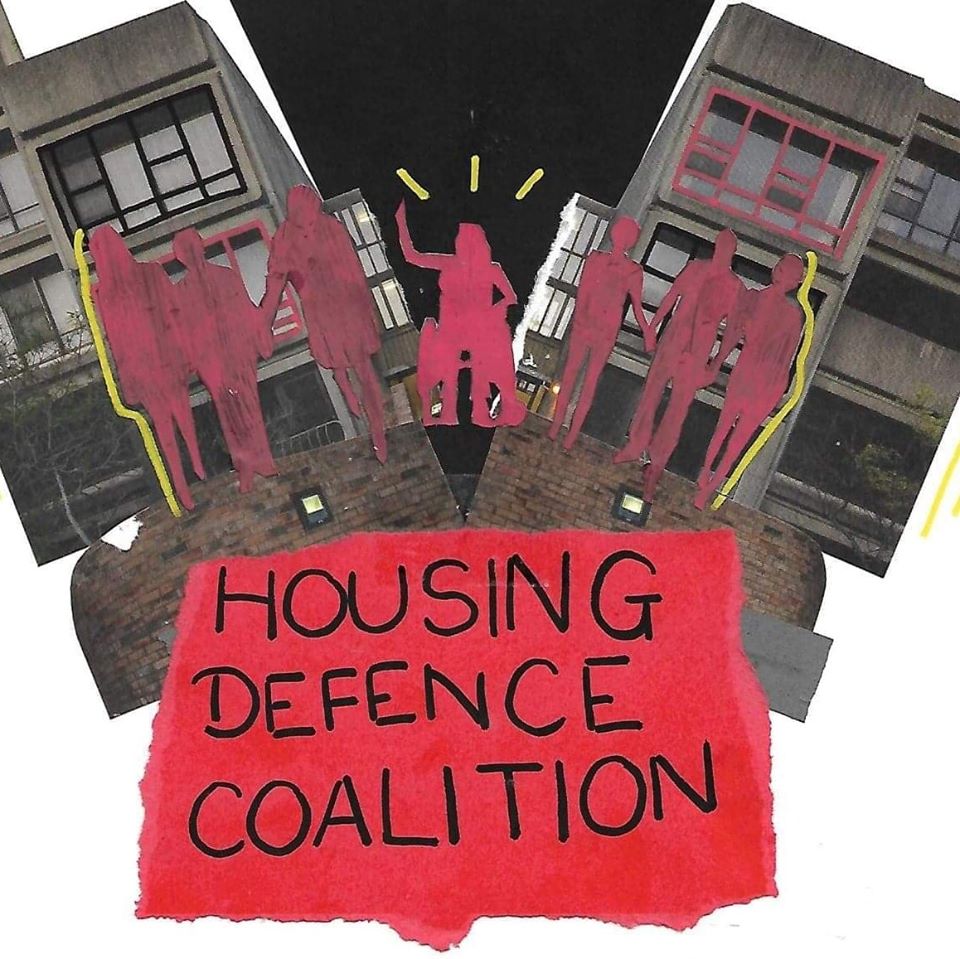“A Political Injustice”: An Interview With the Housing Defence Coalition’s Adam Adelpour
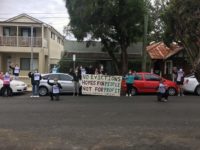
The Housing Defence Coalition stepped in on 20 April to prevent a St Peters tenant by the name of Layla being evicted from her place of residence. The New Zealander recently lost her job due to the COVID-19 lockdown and she’d been given three days’ notice to vacate.
As Sydney journalist Wendy Bacon pointed out in the City Hub, the housing activists were able to negotiate on behalf of Layla. This ensured that her period of notice was extended to the required two weeks, allowing her time to consider her options and hopefully keep off the streets.
Layla was not the first tenant the coalition has assisted during the pandemic. And the group warns that it hardly expects it will be its last, as numerous renters statewide are about to be threatened with eviction, regardless of any emergency measures that have been put in place.
And as was the case with the recent inner west action, those in the community left most vulnerable due to their exclusion from the government’s subsidy packages – think, temporary visa holders, short-term casuals and gig workers – are set to be the hardest hit.
A lighter shade of moratorium
The Berejiklian government recently announced temporary rental support measures for the COVID-19 crisis. This involved a 60 day halt on all evictions due to rental arrears for households financially impacted by the virus, which began on 15 April.
After this 60 day stop, the rental arrears eviction restriction will still apply to eligible renters for six months, unless landlords can show they have a good reason to evict, after they’ve attempted and failed to negotiate an agreement with their tenants – initially personally, and then via Fair Trading.
And if you weren’t too sure whilst reading that last paragraph, it is correct that NSW authorities have left it up to landlords and their tenants to simply negotiate new rental agreements “in good faith” during the COVID-19 pandemic.
This means that tenants who have recently experienced a job loss, or at least a significant downturn in their financial situation, are to turn to their landlords, ask for a reduction in rent, and hope that any unfair power imbalance doesn’t affect negotiations.
Grassroots mobilising
The Housing Defence Coalition – Sydney has formed in direct response to the precarious housing situation that many NSW renters now find themselves in. “No evictions, foreclosures or rent debt” is the group’s mantra.
And the coalition realises that despite the talk of lifting some pandemic restrictions soon, the impact of what’s just occurred in this state is set to have reverberations within its strained housing sector for some time to come.
Sydney Criminal Lawyers spoke to Housing Defence Coalition spokesperson Adam Adelpour about the successful St Peters action, the reaction that NSW police had to it, and his fears regarding what’s yet to come with this emerging COVID-19 housing crisis.
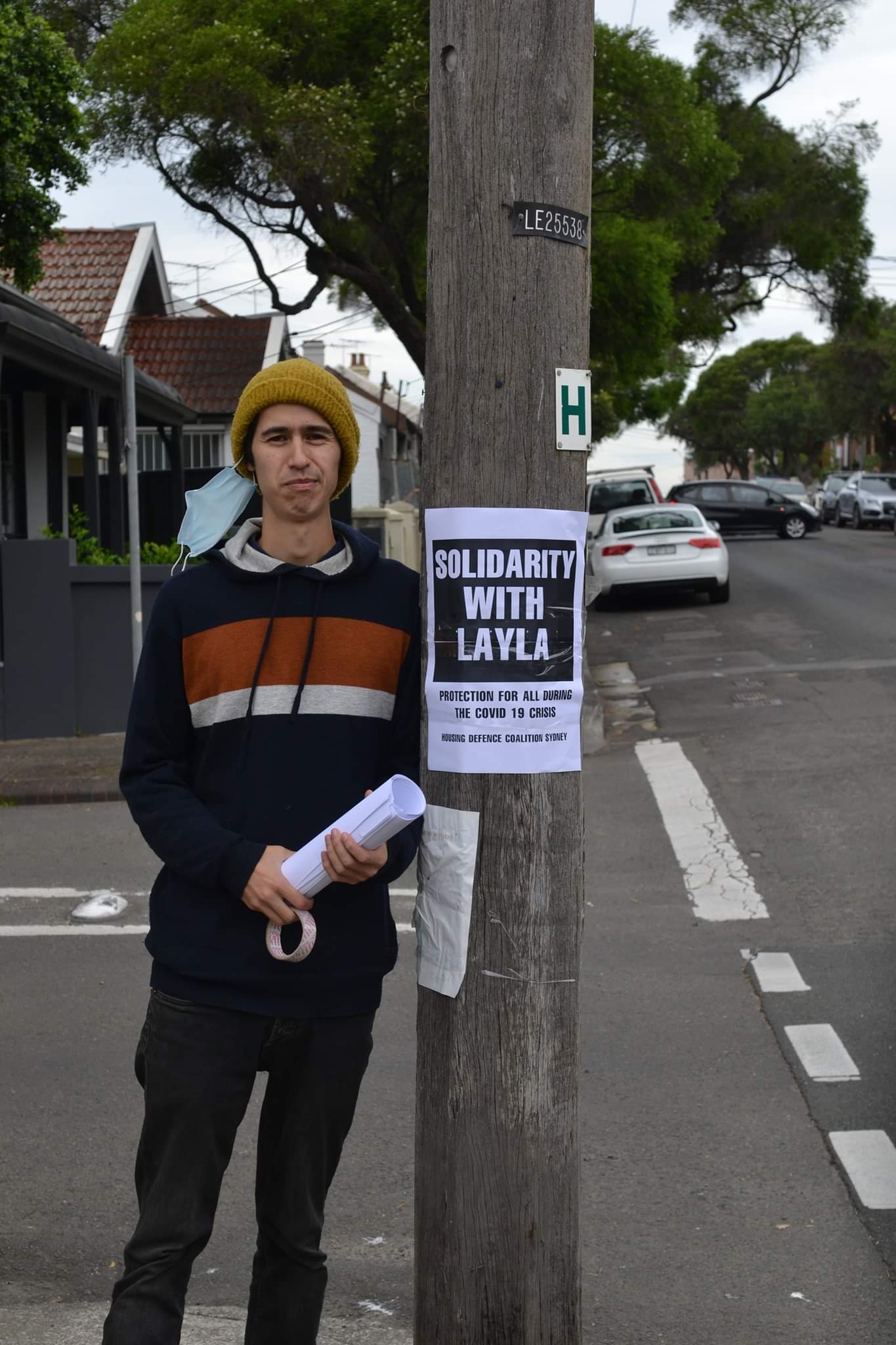
Firstly, the Housing Defence Coalition recently formed to assist tenants facing eviction due to the impact of the COVID-19 lockdown. Last week, it successfully prevented the eviction of a renter by the name of Layla in St Peters. Can you tell us a bit about that action?
That case is a symptom of something that we’re going to be seeing everywhere, as extremely vulnerable people are told that they have to leave their house, when it’s not actually the case.
They will be given a notice to vacate. And if they leave, they’ll lose their house and be out on the street.
In the case of migrant workers, or others not covered by the government support packages, they’re going to be in very serious trouble.
Basically, through community outreach, we heard that this was going on, and there were actually going to be people sent in to remove furniture on the Monday.
What we did was send a core group of advocates to support the tenant and to assert their right not to leave under tenancy laws.
As well as that, there was a mobilisation of community support. So, in the end, there were a number of people who gathered to support this tenant, and as a result, the whole thing was called off.
The tenant was able to get the normal notification to vacate, which enables time to seek support.
So, it was a success, but it was an action that never should have had to have happened.
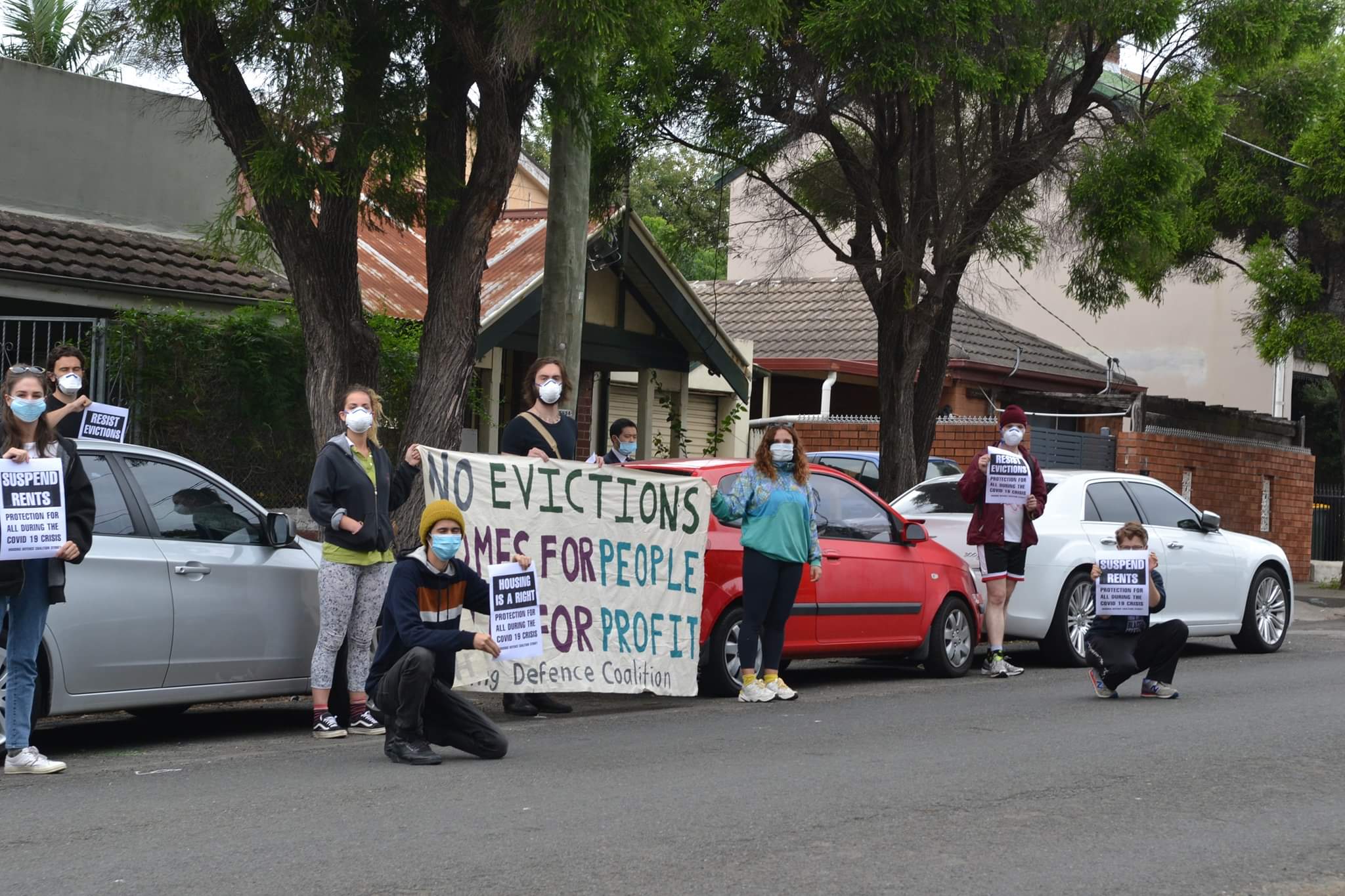
So, they were trying to bluff her out?
Yes, exactly. Obviously, there’s a big power imbalance between landlords and tenants.
In this situation, they can send you a letter, then send some heavies to remove furniture, and once you’re out, you’re out.
It was great we were able to stop it. And it did show that a lot of the people who are doing this are just bullies, and when they’re stood up to, they back off.
It showed we can make a difference. And it was a community mobilisation. Not only did friends and family turn up and show support, but also neighbours, passers-by and people in cars expressed solidarity.
This was not the first tenant your group has successfully assisted since the crisis began. The Housing Defence Coalition stopped Sydney University evicting some of its student tenants.
Adam, in your understanding, how many people are out there in NSW facing conditions that would lead to their being evicted under normal circumstances?
It’s impossible to tell. But, you see very serious problems everywhere. The charities are inundated with people saying that they’re going to be homeless.
At the Sydney Uni housing, you had student after student saying the money that they used to have was now gone. And they no longer had a job to pay the university or the housing company.
On top of that, their parents couldn’t send them money, because back home they’re in lockdown. And all these people can’t get Centrelink.
While it’s a hard time for everyone, there are people out there who have no safety net whatsoever. And they’re really falling through the cracks.
In both those cases, with Layla and Sydney Uni, it has been migrant workers who are absolutely getting shafted after enriching our economy with their contributions.
It is a political injustice that this is happening. It’s not just individual cases of bad landlords. These people have been denied something they should be getting, which is government support.
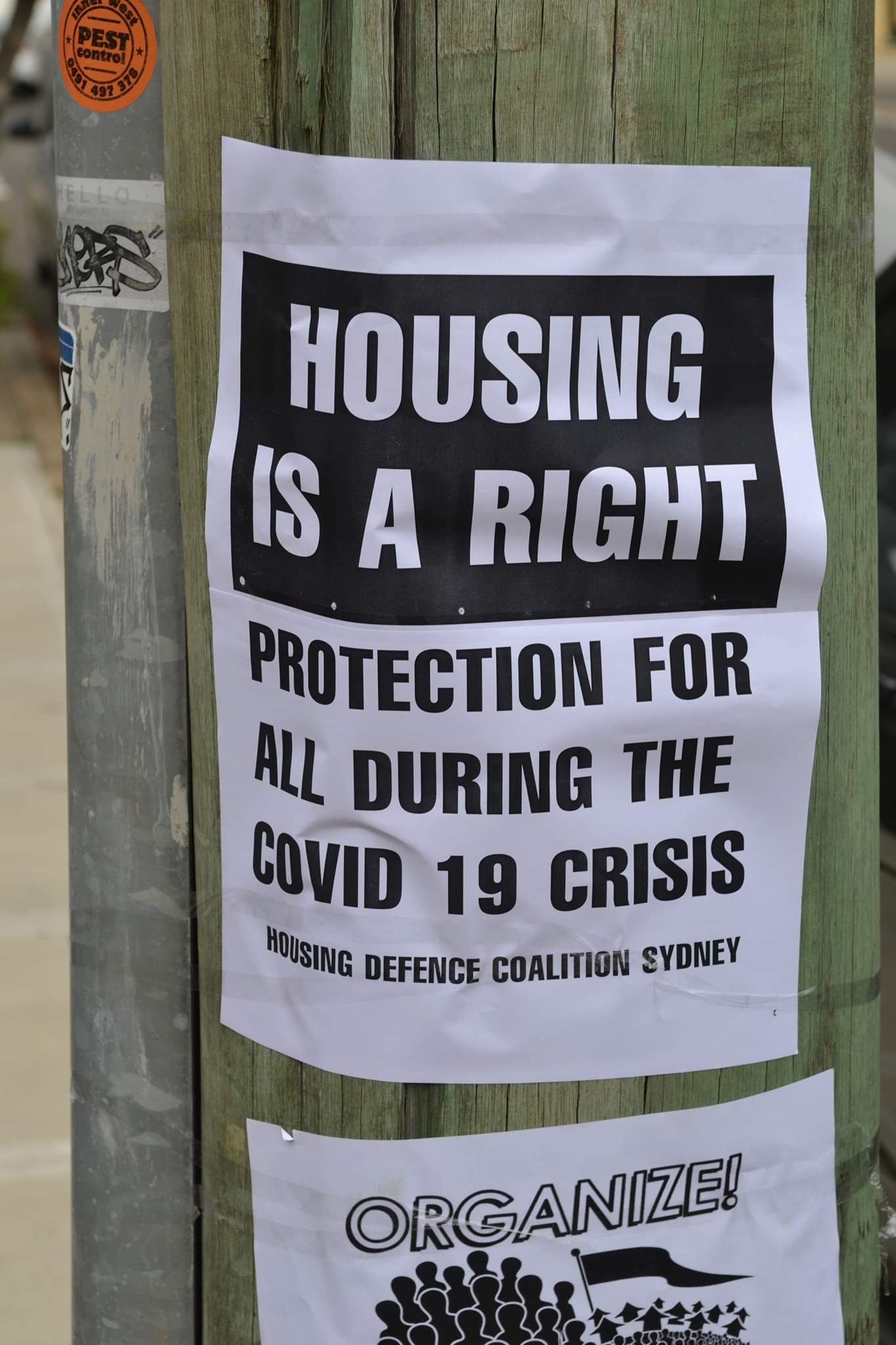
NSW parliament passed some emergency laws on 24 March to deal with the COVID-19 crisis. These included provisions put together by NSW Greens MP Jenny Leong to enable a moratorium on rental evictions.
However, what we ended up getting was different to what was initially envisioned. What are NSW renters experiencing on the ground right now?
What we’ve ended up with is a very limited and conditional stop on some evictions.
That’s obviously another tool in people’s hands that they can use to defend themselves against the threat of being thrown out on the street.
If you have lost 25 percent or more of your income due to COVID-19, and you’re being evicted for rental arrears, you have a stop on evictions for 60 days from 15 April.
There are also some restrictions on how easy it is to apply for an eviction order for six months. But, there is not a moratorium on evictions.
The Greens were right to demand that there should be. There should be no ifs and no buts. There should be no if your bank account looks poor enough, you won’t be thrown out on the street. No one should be evicted during this pandemic.
The laws are inadequate. Even where people are protected legally, because of the power imbalance, they’re often just heavied out of their houses anyway. Because they don’t have access to the support, like Layla got.
In the early days of the crisis, the PM called for a six month moratorium on evictions. Most now claim Morrison’s comments were hot air. Is it correct in saying that you cannot be evicted for arrears for the next six months?
No. There are restrictions to applying for an eviction order, in that the landlord has to have shown they have negotiated for a rent reduction in good faith.
Where the tenants are protected by the law, they have to go through Fair Trading. There has to be mediation. And if they’ve done all that, it goes before the tribunal, which decides whether they get that order.
But, if you were already in arrears before the laws were introduced, they’re not retrospective, even if it was because of COVID.
If you’re in rental arrears because you are poor, and you lost your job for another reason before COVID, you’re not protected by the laws.
Also, what you’re seeing is landlords saying they will reduce people’s rent, but it’s actually only a deferral that you have to pay back later.
So, people who can’t afford to pay one rent, will eventually be paying two rents, in order to pay back their landlord.
So, people are building up debts?
Yes. We are hearing about a lot of these cases. The first offer a landlord makes is a rent reduction, that you have to pay back later. But, you actually have the right to negotiate on far better terms than that.
In our view, it should simply be the case that no one should be evicted, rents should be either suspended or reduced to 25 percent of someone’s income, which is what is considered affordable.
And if they’ve got no income, then it is nothing.
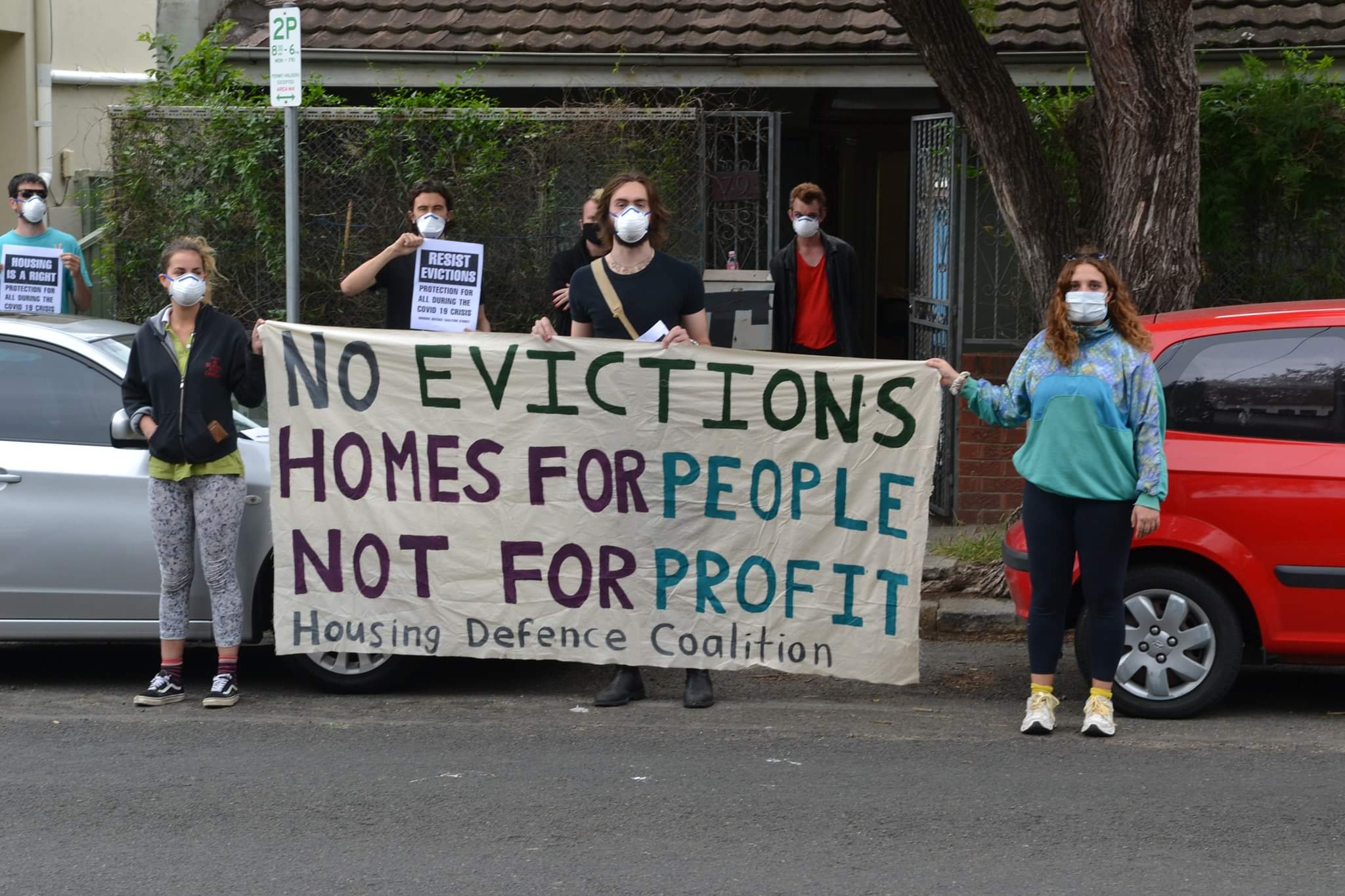
You staged your protest in St Peters last week in a socially distanced manner. However, unlike some other rallies that have occurred during the lockdown, the demonstrators involved were not located inside of cars.
How did the authorities react to the way in which you staged your protest last week?
There was the core group that went to support the tenant, and then there was the community support.
Everyone who showed up to stop that eviction was subjected to some form of intimidation from the police.
Officers went around and told everyone that they were in breach of the Crimes Act. That it was an unlawful assembly. And on top of that, under the public health orders they could be fined $1,000.
What I found particularly terrible about that was we were doing it safely. There was far less exposure in that action, than going to IKEA and buying a lamp.
But, on top of the core group, there were people who were turning up out of pure empathy to support this tenant.
These were people who had also lost their jobs and are scrapping by themselves. Then they had the police telling them that if they lent support, they would be fined $1,000.
It is an incredibly reprehensible abuse of the public health orders. And there’s far too much scope for selective, unprincipled, intimidating police discretion with these orders – that’s how they’ve been implemented.
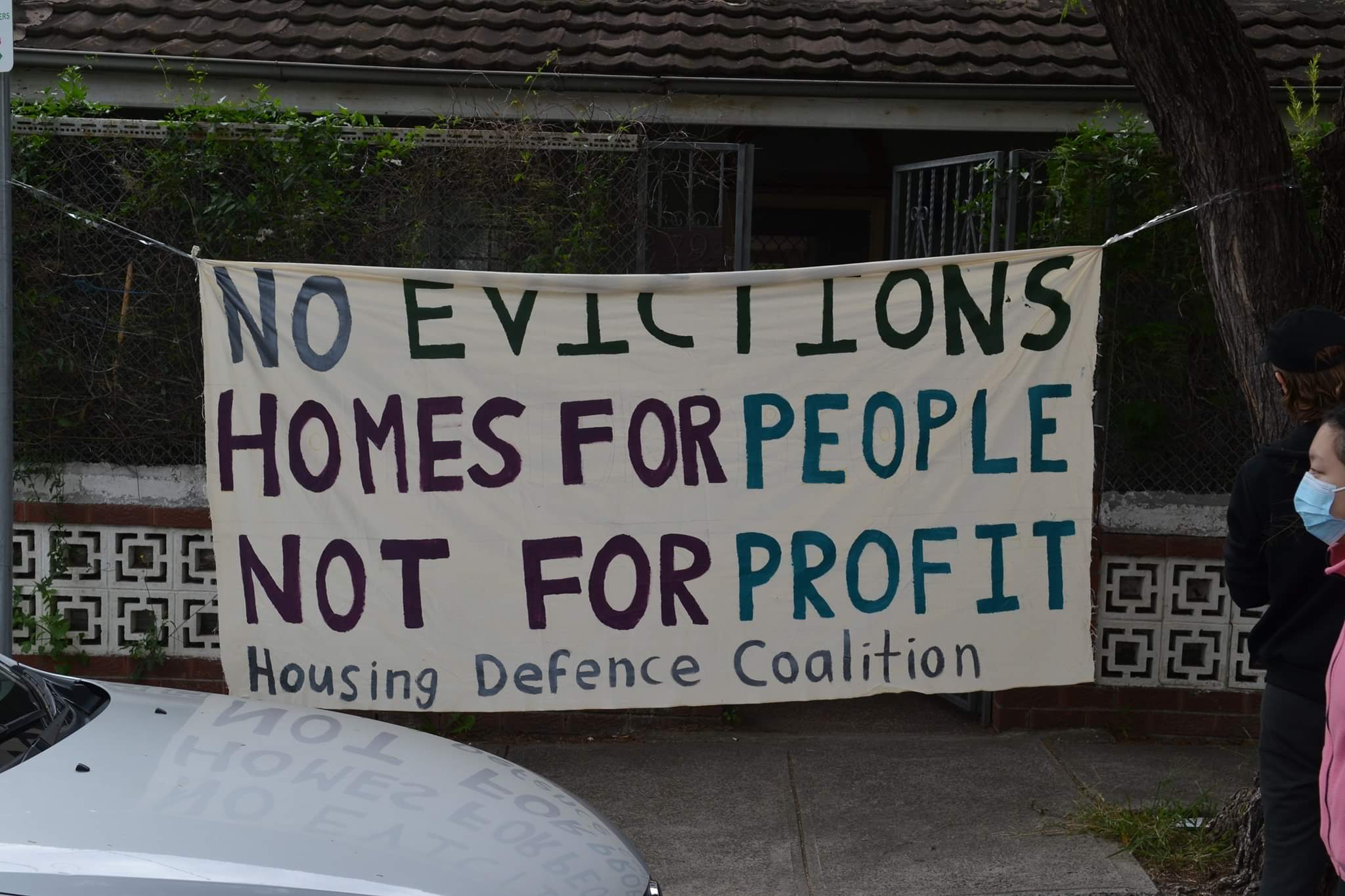
Would you say that the current situation has highlighted any issues with the way that the Sydney and NSW housing markets were operating prior to the onset of the pandemic?
Absolutely. It has highlighted how vulnerable our renters are to any sort of change in their economic situation.
As for the rental market, you’re right to have a house is conditional on what’s in your wallet. That’s not acceptable.
There has been a whole range of commentary before this happened about the affordability of housing, the massive increase in the homelessness rate, the fact that you have one hundred thousand people who are homeless, and all this has come on top of that.
There is a huge problem with a lack of affordable and secure housing. So, it’s particularly annoying that government is spending hundreds of billions of dollars to stimulate the economy, but there is no construction of public housing to create jobs, to stimulate the economy and to address the huge social need.
That more than anything highlights how the government’s response has tilted much more to bailing out business than helping the community and the people at the bottom.
And lastly, Adam, what’s next for the Housing Defence Coalition from here? Are there a number of potential evictees on your list? And do you expect any further changes to tenancy laws in this time of COVID-19?
We would like to see the laws shift dramatically in tenants’ favour. We would like the eligibility to be covered by those laws to be far greater.
But, until that happens, there will be case after case of either landlords breaking the laws or taking advantage of inadequate laws.
You can now be evicted for other things that aren’t based on being able to pay the rent during COVID.
So, a whole range of people who may have lost their jobs and can’t pay the rent because of the pandemic, may have their landlord make up an excuse as to why they need a no grounds eviction.
Whether the excuse is true or not, it will still scare some people into leaving their homes unless they get support.
So, we will definitely continue to reach out to people, see if they need help, and then deliver that support.
